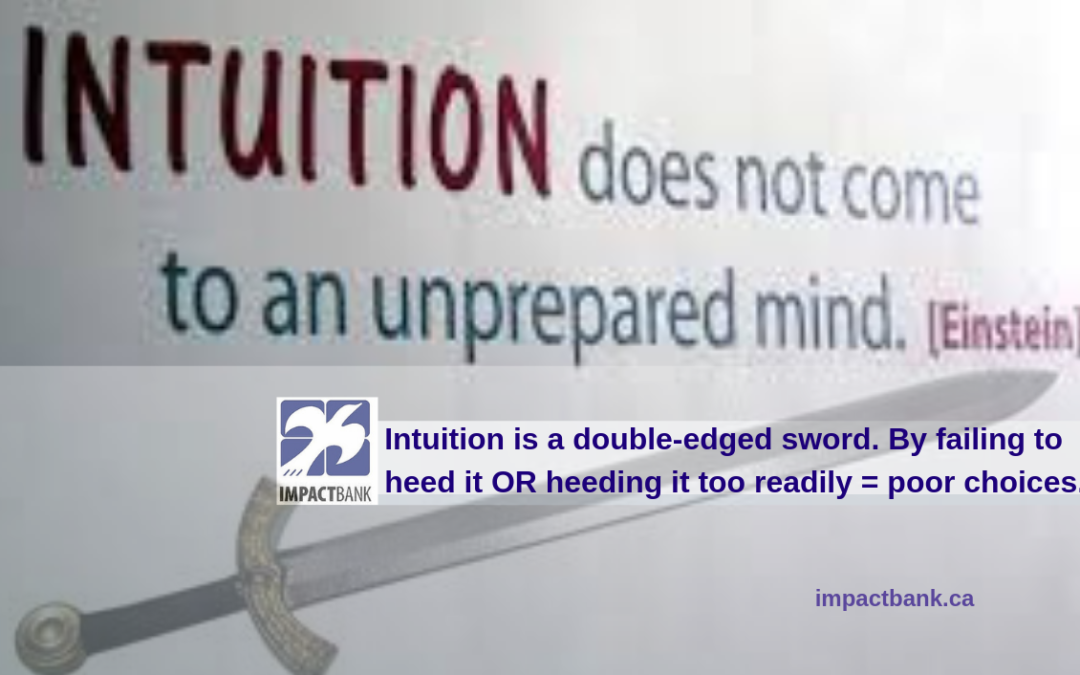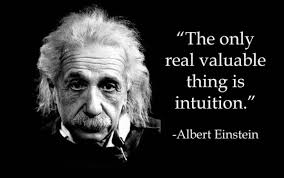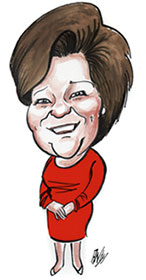Intuition is a doubled edged sword. When failing to heed it, people act overly cautious and when heeding it too readily, without careful consideration of its source, they may make very poor choices in life. Gurdjieff’s model, the Enneagram, suggests people tend to lean more into one of three ways of being: the head (rational thought), the heart (feeling), and the gut (intuition). I studied the Enneagram in the 90’s and I argue, and I think the Enneagram supports this, that every human being has equal access to each of these. Moreover, each has equal value. Where, among the three, one starts isn’t so much of a choice as where one goes. Furthermore, the intention of this post and the supporting posts is to dig into intuition, exploring its strengths and weaknesses, in hopes each reader will recognize the value of choosing and adjusting their “way” wisely.
In the podcast, I share a personal story of following my gut and being burned because I lacked the necessary experience to make the call. In the newsletter, I show how, even 30 years later, when allowing my head to take me into analysis paralysis I made the opposite error. While making the Wednesday video on Instagram and LinkedIn I had an interesting insight about how intuition may be a reflection of our sense of self. This post is an attempt to bring it all together.
Intuition Sucks!
This was the title I used for this week’s podcast episode. A client suggested I was being too negative because he argued that as he’s been developing his own, intuition has been very useful. That’s great and frankly I agree. In the Myers-Briggs assessment, which isn’t the most useful of assessments, I’m an off-the-charts NT which stands for Intuitive-Thinker. I know the value of intuition. I also know, as I relay in the podcast story from my 20’s, how disingenuous one’s intuition can be when not applied thoughtfully.
In fact, I suggest each reader stop and think about the last time intuition failed to serve the best outcome. When intuition gets things wrong, it sucks and each and every one of us must realize this likely happens more than we realize. In the moments when we see, acknowledge and accept this fact, we learn a lot. This is how we train our intuition. Otherwise we are masking our assumptions, biases, limiting beliefs under the cloak of intuition. Below, we’ll start exploring how it can suck by examining the definition and then shift to figuring out how it can fit into a life or thinking strategy and suck a bit less
Defined
In the podcast I share how Daniel Kahneman, who wrote Thinking Fast and Slow, clearly articulates a problem with how most of us define intuition. “Knowing without knowing how you know.” Kahneman’s argument is that people who trust and lean into intuition conclude that they know something. Not that they conclude or suspect something. Not that they feel something or fear it. That they KNOW it. As though it’s a fact. That is a problem, waiting to happen. Once a conclusion is established openness is abandoned. Intuition is like a first impression, there may be something more to learn before banking on what one thinks they know.
Kahneman suggests a better definition: “thinking that you know without knowing why you do.” This definition is more nuanced. By acknowledging the knowing isn’t absolute or infallible, we’re open to accept new information to build and expand where our intuition has landed. In my Wednesday LinkedIn video, I reflect on how a first impression shifted and changed over the years in relation to someone who has been a big influence in my life. I received a message from someone after watching it, suggesting this wasn’t intuition but rather an experience of two people changing or growing over time. There’s truth in that observation. Intuition though, if poorly defined, suggests we know someone without knowing how. This will limit one’s ability to recognize the growth in another remaining stuck in the original conclusions. The better definition is applied when one is willing to question the “knowing” that revealed the initial conclusion.
How Intuition Fits
As previously mentioned, intuition is one of the three brains or domains, as Gurdjieff suggests. Intuition is most directly related to the gut brain. It defines or explores how we experience and sometimes viscerally react to what’s happening. It’s completely and deeply connected to the heart and head brains. They simply have different functions. Almost every model of personal change or growth includes a reference to two or all three. When used in concert they make great music together. Furthermore, while each of us may start from one domain, we have choice to move into and through all of the domains.
The head brain focuses on processing information. It’s figuring things out empirically; it’s the control centre. Making connections and inspiring, organizing or motivating action is the heart brain. Intuition is in the gut or body brain. It translates what we’re feeling or the impressions we’re forming. The more well-developed the first two are, the more valuable the instincts in the third will be. The gut brain is the most instinctive. When the head brain is mapped by neuroscientists, we’ve learned there are plenty of paths for forming and tracking instincts, but the gut brain remains critical. In fact, research has revealed the gut communicates ten times more to the head brain than the other way around. Most people will relate to how they experience reactions with butterflies or aches in their belly. When we learn to regulate our breathing, deep diaphragmatic breathing, we can calm all three of the brains.
Trusting Your Intuition
Kahneman posits that we may be too quick to trust our intuition. Einstein’s quote in the image suggests the opposite. (Feel free to ignore my cheeky caption.) When considering the two perspectives, I’ve concluded two things. First, Einstein typically spent time with people who were stuck in their head brain and his genius came from being able to balance it with the gut brain. There are many famous stories about how his best work came intuitively. Of course he grants it a lot of value. But would he EVER relinquish his ability to process the complex? Secondly, Kahneman has had access to more sophisticated tools for evaluating how our brain works. Additionally, he and Tversky completed many experiments to support his concern about how we blindly trust intuition. In conclusion, I suggest Kahneman has more credibility on the subject.
When Trust is Warranted
Although I stated that Kahneman has more credibility about intuition than Einstein, perhaps another of his quotes helps support Kahneman’s bigger point. Einstein famously said, “The intuitive mind is a sacred gift and the rational mind is a faithful servant. We have created a society that honours the servant and has forgotten the gift.” While I fundamentally disagree with this, I understand how, as I mention earlier, Einstein’s experience in the world of like-minded men, likely lead him to this conclusion, intuitively. If it was true then, it’s not now. We worship the intuitive. We are even entitled to our own facts. Data may be called king but even it’s being used to push the intuitive to the unsuspecting.
So when, then, is trusting intuition wise? In the section below, by outlining when it’s not, I’ll answer the question differently. Here I’ll simply say, be wise enough to realize what intuition is, so it maintains real value. Often I realize in myself and my clients how the gift of intuition is commonly described as a realization after-the-fact. That’s both interesting and troubling. If one only sees how a feeling proves to be true, after-the-fact, how about the many times it didn’t. How often is it wrong and therefore not notable? Also, how do we harness the energy of intuition appropriately if we haven’t learned its value or function.
Eight years ago, I suffered a stroke. I hired a medical intuitive, Mona Lisa Schulz. She’s taught me a lot about intuition, and I value it deeply so when you see me writing or saying that intuition sucks, it’s critical for me to articulate how I also value it. Additionally, in Gurdjieff’s model, the enneagram, I learned I start in the gut brain, so intuition is a core strength I enjoy.
When Trusting Intuition is Not Warranted
In the podcast I outline Kahneman’s three conditions to determine whether trusting your intuition is warranted. The story I share may help add some nuance. My best advice is to NOT trust your intuition unless the three conditions outlined below exist or partly exist. Of course, consider the consequences too. In some cases, when the risk is low there may be value in testing it.
-
Regularity or exposure
This speaks to how much exposure one has to the person, idea, or concept at the centre of the intuitive sense. In the podcast story I’m a newbie in the field but I know myself. I may have held my ground rather than taking the leap, had I considered how the risk-taker in me could act rashly.
When considering relationships, the degree of intimacy and exposure are critical factors. A well oiled team takes time. Over that time they learn to anticipate each other allowing them to trust their intuitive conclusions more readily. A married couple don’t learn each other’s “tells” accurately for years. Conscious exposure will determine the accuracy of intuitively based conclusions. Perhaps we project onto others, thinking it’s intuition before we know the person long enough to distinguish between the two.
-
Practice or perhaps intentional or focused practice
Fully trusting intuition in any aspect of life grows with not only more but different experiences. Practice is great, of course. Varied and intentional practice is much better. Think of an athlete or a speaker or a leader who adjusts on the fly. Past practice helps. The more types of experiences provide better instincts to respond effectively and perhaps to see around corners and anticipate both problems and opportunities.
The person who focuses on practicing intentionally, no matter what skill they seek to improve, will grow the skill and the intuitive foundation to support the other two brains.
-
Feedback – the more natural or organic the better, including natural consequences
Feedback is both difficult to give and receive. If there is an area where anyone wants to become more intuitively strong, seeking and welcoming feedback is critical. It may come in the form of performance results or a even a rough failure. It may be in the faces of an audience or the results of a race. There are times when the best way to gather the feedback is to specifically ask and dig into what is underneath the first response.
In the podcast episode I share how I didn’t know what I didn’t know because I had enjoyed a static environment for the first year of my learning. Be wise enough to recognize when a lack of opportunity to experience the ups and downs exists. It is in this varied experience we organically learn the biggest lessons.
The value of one’s intuition may rest first and foremost on the degree to which they are self-aware. All three of the conditions above are elements worth including in a quest to become more self-aware. That is the place to start. A career and a life are more deeply impacting and impacted when a healthy mix of all three brains – the head, heart and gut – are kept at peek balance and performance. AND, as I often say, a healthy dose of self-compassion is essential because no one will get it right all of the time.
Walk With Me…
In April 2018 I brushed up against a call for meaning; an insight of sorts. It ultimately moved and inspired me to shift the focus of my practice. I’m walking with 30 somethings, who are truly in a pivotal spot in life and career. Whether HERE by age or spirit, I want to walk with these seekers! Seekers who are ready to do some self exploring & find the real meaning of their life? The research suggests people embrace their inner REBEL during their 20’s while most slip quietly and comfortably into ACCOMMODATOR in their 30’s. This documented pattern grabbed my attention and my mission was made clear. Moreover, I’m intent on resurfacing that inner rebel whose perspective, now shaped with more experience, may offer insights many typically miss when they matter most.
In June 2018 I took a course in story telling. I was intent on finding my “Big Why” to help me understanding my purpose for shifting my practice. Ultimately, I landed on my story. It spans from my childhood, with a pivotal point in my early 20’s finally culminating in a significant career turning-point at the age of 37. This story revealed an unhealthy pattern while illuminating my purpose. In fact, I feel motivated when remembering the moment of insight because this transition is difficult. Ultimately though, it adds meaning to my work. Listen below…
Feel like you’re living someone else’s destiny?
If that is working for you, great. If it isn’t or it starts to be a problem, reach out. I welcome a conversation.
Willing to do the work to find more meaning?
Once you have the skills to unpack the emotions and barriers and triggers and mindset challenges with the skills in my BYI system, you’ll begin to see the impact in your career and you’ll find what matters most to you. Join me…
My goal is to make my system accessible and affordable. There are many ways you can engage with me….below you’ll find THREE to get started, without spending a dime.
WALK WITH ME…
- REGISTER for an ASK ROX RoundTable… TWO 50 minute engagements on ZOOM – the second Tuesday and the last Friday of every month – limited to 12 participants in each.
- BOOK a complimentary exploratory conversation 20-30 minutes.
- SUBSCRIBE to my mailing list from my home page, receive an interactive exercise helping you cope with stress, and a weekly reflection.
Of course I’d love to work with you, your team or organization so…
- Book me to speak at your conference or to a group in your organization. My workshops on building resilience, improving relationships, and increasing performance are popular.



